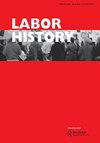‘A first class medium’: the cautious anti-communism of the ICFTU’s International Labour Film Institute, 1953-1972
IF 0.7
4区 管理学
Q1 HISTORY
引用次数: 0
Abstract
ABSTRACTBetween 1953 and 1972 the International Labor Film Institute (ILFI), affiliated with yet organizationally separate from the International Confederation of Free Trade Unions (ICFTU), spread knowledge about, and encouraged the use of, films among Western trade unionists. Holding five formal film festivals, the ILFI also engaged in the collection and distribution of information about films and filmstrips on trade union topics, themes, and successes. Yet compared to other ICFTU forums, ICFTU and ILFI officials were relatively muted on Cold War issues when it came to film activities. When they did discuss such topics, they evidenced a level of uncertainty and confusion regarding how intensely to engage anti-communist messaging in the area of labor films, indicating a concern over how to strike the correct balance between showcasing topics solely focused on labor and engaging Cold War themes. Studying the ILFI and Western labor’s relationship to the medium of film thus reveals both an anxiety among Western labor leaders during the early and middle years of the Cold War over how best to weigh their desire to help workers with their goal of appearing sufficiently anti-communist as well as another way the vagueness of the ICFTU’s slogan of ‘free trade unionism’ impacted the ICFTU’s activities.KEYWORDS: International Confederation of Free Trade UnionsInternational Labour Film InstituteILFIICFTUanti-communismfree trade unionismJ.H. Oldenbroek Disclosure statementNo potential conflict of interest was reported by the author(s).Additional informationFundingThis research was funded in part by research travel grants from Regent University.Notes on contributorsKevin E. GrimmDr. Kevin E. Grimm is an associate professor of history at Regent University in Virginia Beach. His work has appeared in Labor History, the Journal of Contemporary History, the Journal of West African History, and Cold War History. His first book, America Enters the Cold War: The Road to Global Commitment, 1945-1950 (2018), is part of Routledge’s Critical Moments in American History series and he is currently working on a book on the ICFTU and Ghana.“一流媒体”:1953-1972年,国际劳工联合会国际劳工电影学院谨慎的反共主义
1953年至1972年间,隶属于国际自由工会联合会(ICFTU)但在组织上又与之分离的国际劳工电影协会(ILFI)在西方工会会员中传播关于电影的知识,并鼓励使用电影。国际劳工联合会举办了五届正式电影节,并收集和分发有关工会主题和成功的电影和短片的资料。然而,与国际自由工会联合会的其他论坛相比,国际自由工会联合会和国际电影协会的官员在涉及电影活动的冷战问题上相对沉默。当他们讨论这些话题时,他们证明了在劳工电影领域如何强烈地参与反共信息方面存在一定程度的不确定性和困惑,这表明他们担心如何在展示仅关注劳工的主题和参与冷战主题之间取得正确的平衡。因此,研究国际第四国际和西方劳工与电影媒介的关系,揭示了冷战早期和中期西方劳工领袖的焦虑,即如何最好地权衡他们帮助工人的愿望与他们表现出充分反共的目标,以及国际劳工联合会“自由工会主义”口号的模糊性对国际劳工联合会活动的另一种影响。关键词:国际自由工会联合会;国际劳工电影协会;国际劳工联合会;披露声明作者未报告潜在的利益冲突。本研究的部分资金来自摄政大学的研究旅行补助金。作者简介:kevin E. GrimmDr。凯文·格林(Kevin E. Grimm)是弗吉尼亚海滩摄政大学历史学副教授。他的作品曾发表在《劳工史》、《当代史杂志》、《西非历史杂志》和《冷战史》上。他的第一本书《美国进入冷战:全球承诺之路,1945-1950》(2018)是劳特利奇《美国历史的关键时刻》系列的一部分,他目前正在写一本关于国际劳工联合会和加纳的书。
本文章由计算机程序翻译,如有差异,请以英文原文为准。
求助全文
约1分钟内获得全文
求助全文
来源期刊

Labor History
Multiple-
CiteScore
1.00
自引率
28.60%
发文量
44
期刊介绍:
Labor History is the pre-eminent journal for historical scholarship on labor. It is thoroughly ecumenical in its approach and showcases the work of labor historians, industrial relations scholars, labor economists, political scientists, sociologists, social movement theorists, business scholars and all others who write about labor issues. Labor History is also committed to geographical and chronological breadth. It publishes work on labor in the US and all other areas of the world. It is concerned with questions of labor in every time period, from the eighteenth century to contemporary events. Labor History provides a forum for all labor scholars, thus helping to bind together a large but fragmented area of study. By embracing all disciplines, time frames and locales, Labor History is the flagship journal of the entire field. All research articles published in the journal have undergone rigorous peer review, based on initial editor screening and refereeing by at least two anonymous referees.
 求助内容:
求助内容: 应助结果提醒方式:
应助结果提醒方式:


